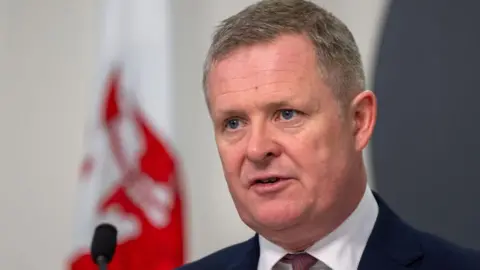Back of queue threat for people who miss NHS appointments
 PA Media
PA MediaPatients who regularly miss NHS appointments could be sent to the back of the queue under plans to cut waiting times.
It is one of a number of Welsh government ideas being discussed to improve the NHS, which has recently seen small reductions in record waiting lists.
New targets to cut waiting times over the next year have also been set out by the Welsh government, with Health Secretary Jeremy Miles saying the aim is to reduce the overall size of the waiting list by around a quarter by March 2026.
The threat of sanctions would be balanced by an improved Welsh NHS app, which would allow patients to track their progress through the system and make or amend appointments at the touch of a button.
Miles said his strategy aimed to reduce NHS Wales' waiting list by 200,000. The waiting list is currently is 800,000.
Speaking to Nick Servini on BBC Politics Wales, Miles said he was confident of "getting pretty close" to hitting the target to bring the longest waits, of more than two years, down from 24,000 to 8,000 by the end of March.
The official figures will not be confirmed for a number of weeks. In England, the equivalent figure has virtually been eradicated.
Miles also confirmed the target was to bring two-year waits down to zero by March 2026, as well as restoring a maximum eight-week wait for tests.
When asked how the cuts to waits would be achieved, when so many targets have been routinely missed in the past, he pointed to intense weekly performance management of health boards.
New information will be made available to patients about the performance of each health board, as well as where they sit on waiting lists.
Miles said: "I'm not prepared to continue funding ways of working which we know don't deliver the best outcome for patients and aren't the best value for money.
"So we'll be linking that funding with the task that I already set the NHS, which is to bring in measures to make services more efficient and effective, and I'll be publishing their performance against those measures so we can all see how that is going."
 Getty Images
Getty ImagesIn a speech to health leaders on Monday, Miles will also provide more information on the Welsh NHS app that will allow patients to track their progress on waiting lists.
He said achieving the new targets would be made possible by reducing the number of missed or cancelled appointments, which stood at about 700,000 last year.
He went on to say that if patients missed appointments "twice or more, then people do risk being referred back to their GP".
"I think that's about saying to people, 'if I can't be there, if I'm not better, tell somebody I can't go'. Why should my neighbour, my friend, my family member, lose the opportunity of that appointment?"
As part of the plans, health boards could also have their funding clawed back if they have been given extra cash to hit specific targets that they do not achieve. But this would not affect core health board funding.
The plans are being framed as striking a new deal between the NHS and patients, where there would be a greater expectation for patients to play their part.
In order to better manage waiting lists, there could also be increased levels of intervention to get patients fit for surgery, such as people being asked to lose weight or exercise more before they are placed on a waiting list.
The way the NHS in Wales is led is also likely be streamlined - with the aim of making it simpler and more accountable - just two years after previous changes.
The NHS Wales Executive was established in 2023 as a "hybrid" body made up of NHS staff and civil servants, with the aim of strengthening leadership and helping to transform clinical services.
But a highly critical Audit Wales report into cancer services earlier this year raised serious concerns about its effectiveness, with auditors finding "confusion and duplication "at leadership level" and a "lack of clarity" about the responsibilities of the Welsh government and the executive.
The Welsh government is also thought to be considering commissioning at a national level for services provided by the private sector to try to get better deals, rather than what it sees as a local and last minute approach.
Health boards are expected to push back against the idea, but ministers are expected to argue the new proposal would lead to better planning and value for money.
A panel of independent experts, which was commissioned in October to review the NHS, is expected to publish its findings at the end of April.
They are thought to have serious concerns about the effectiveness of performance management.
Welsh Conservative health and social care spokesman James Evans said the party was in favour of the proposals, but added that they would not be enough on their own to cut the long waits for treatment.
"We need to see restrictions lifted on cross-community, cross-border and cross-sector capacity sharing in the short term, with more NHS beds, social care funding and a substantial workforce plan enacted in the longer term," he added.
Additional reporting by Nick Servini
